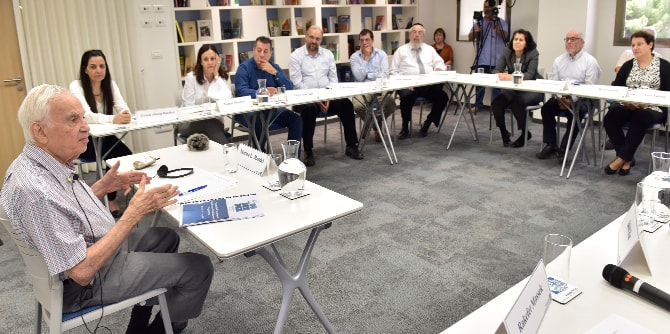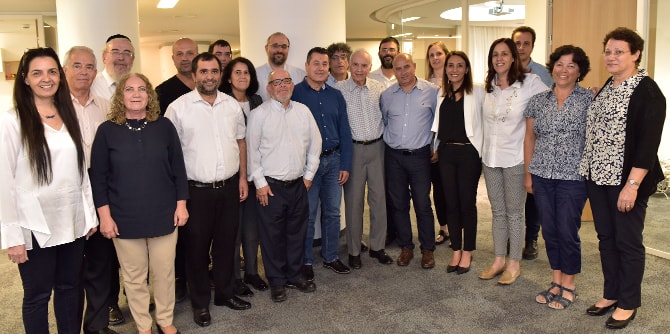Morton L. Mandel, chairman and CEO of the Jack, Joseph and Morton Mandel Foundation, was the guest of honor at the 10th session of the Mandel Graduate Unit's program for directors and board members, which took place on May 2, 2018.
The highlight of this session was the opportunity for graduates to meet with Mr. Mandel. The graduates opened by introducing themselves and their work in the educational-social arena. Mr. Mandel complimented the graduates, and noted that by working to realize their own visions, they are also fulfilling his dream of helping the State of Israel to flourish.

Mr. Mandel explained that being a board member is an opportunity to change an organization for the better, thereby improving the world. He emphasized that one must be a constructive force on the board, and display strong and positive leadership. Mr. Mandel noted that the reward for such service is not financial; rather, it stems from the knowledge that the organization has improved as a result of your involvement in its board.
Mr. Mandel emphasized the importance of values as a compass for behavior. He stressed that integrity, honesty, respect, and generosity are the values that should guide the actions of every human being, and called on the graduates to be “fighters” in the struggle to ensure proper conduct of the boards of which they are members. Success, he told the graduates, is the ability to look in the mirror and be proud of who you have been and who you are, secure in the knowledge that you are a “mensch.”
Mr. Mandel also spoke about the relationship between a board's chair and CEO. He explained that it is the chair’s responsibility to ensure that the CEO’s actions reflect the organization’s principles. This supervision is oversight, not interference, and must be carried out by the chair with respect and discretion. At the end of the fascinating and inspiring discussion, the graduates thanked Mr. Mandel for sharing his insights with them.

The session started with a lecture by
Attorney Yoav Lalum, a graduate of cohort 23 of the Mandel School for Educational Leadership and a participant in the training program for directors and board members. He spoke about conflicts of interest and favoritism in administrative law, which is the foundation for the rules governing conflicts of interest in corporate law. He explained the difference between personal conflicts of interest, institutional conflicts of interest, and favoritism. He also spoke about conflicts of interest in appointments committees, the impact of breaches of regulations regarding conflicts of interest, and ways of avoiding such breaches.
Next,
Limor Edri-Elimelech, an accountant, lecturer, and financial management consultant for businesses and social organizations, spoke about financial reports. She presented information and tools necessary for analyzing the content of these documents, and emphasized that a director or board member must be able to understand financial reports independently, without relying on other members of the company. She also explained that financial reports are a summary and must be read with an appreciation of their organizational context: they require an understanding of the financial implications of the information they contain based on additional study and a broad perspective, which can be achieved by meeting with members of the organization in the field and examining processes and activities that are being carried out in practice.
Eyal Globus, head of the Israeli Corporations Authority at the Ministry of Justice, gave a lecture on regulation in the non-profit sector that explored the similarities and differences between the role and responsibilities of the boards of businesses and non-profit organizations. He reviewed the organizational structure and mission of Israel's Corporations Authority; contrasted the Companies and Partnerships Registrar with the [Non-profit] Associations Registrar (the former is a support body for the business sector, Israeli commerce, and the workings of the economy, while the latter is responsible for ensuring the proper functioning of non-profit corporations). Globus noted that there is greater oversight of nonprofits than of businesses because nonprofits use public and government funds. He reviewed the roles and responsibilities of the general assembly, the board of directors, the audit committee, the auditing accountant, and the internal auditor, as well as the guiding principles, challenges, and main actors in the area of regulation of non-profit corporations.
